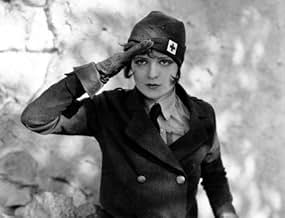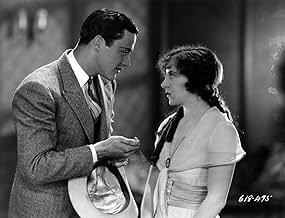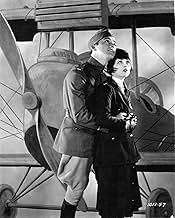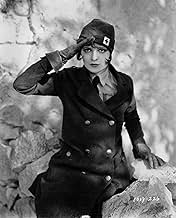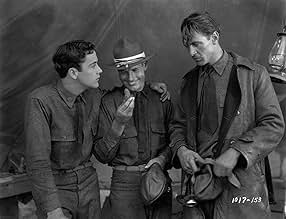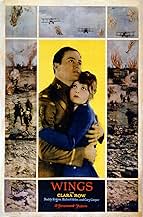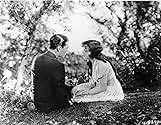CALIFICACIÓN DE IMDb
7.5/10
16 k
TU CALIFICACIÓN
Dos jóvenes, uno adinerado y otro de clase media, enamorados de la misma mujer, se convierten en pilotos de combate en la Primera Guerra Mundial.Dos jóvenes, uno adinerado y otro de clase media, enamorados de la misma mujer, se convierten en pilotos de combate en la Primera Guerra Mundial.Dos jóvenes, uno adinerado y otro de clase media, enamorados de la misma mujer, se convierten en pilotos de combate en la Primera Guerra Mundial.
- Dirección
- Guionistas
- Elenco
- Ganó 2 premios Óscar
- 9 premios ganados y 1 nominación en total
Charles 'Buddy' Rogers
- Jack Powell
- (as Charles Rogers)
Charles Barton
- Soldier Flirting with Mary
- (sin créditos)
Thomas Carr
- Aviator
- (sin créditos)
Thomas Carrigan
- Undetermined Role
- (sin créditos)
Margery Chapin
- Peasant Woman
- (sin créditos)
Andy Clark
- Undetermined Role
- (sin créditos)
Opiniones destacadas
Famous of course for winning the first Oscar for best film, WINGS is also one hell of a good film. Spectacular aerial photography highlights the terrific performances of the three leads: Clara Bow, Buddy Rogers, and Richard Arlen. Director William Wellman creates a solid and moving anti-war statement as he shows us the brutality and stupidity of war, its waste of youth, and its power to destroy the lives of all involved.
The film starts with star-crossed lovers in a small town in America. Bow loves Rogers but he loves Jobyna Ralston. Ralston loves Arlen and he loves her but through a mistake, Arlen thinks she loves Rogers. Then the boys go off to war. The outgoing Rogers thinks the war will be an adventure; the shy Arlen goes off, leaving his devastated parents who cannot express their emotions. Bow soon goes off to be an ambulance driver. Ralston stays homes and waits.
The story follows the rivalry and growing friendship of the boys as they head for war. The story ends in yet another bitter mistake. The viewer is as emotionally drained by the end of this film as the parents were at the beginning.
El Brendel provides some comedy relief. Roscoe Karns has a small part. Henry B. Walthall and Julia Swayne Gordon are the parents. And Gary Cooper has one brief scene with Rogers and Arlen. The scene in which he turns and flashes that famous smile as he exits the tent supposedly made him a star.
Clara Bow is solid as the spirited home-town girl who chases Rogers to no avail. She's gorgeous here and she is even moreso in the Paris scene where the matron lets her borrow a snappy and dazzling dress. Few women in film history have been able to be so sexually charismatic as Clara Bow. She's also a good actress.
Richard Arlen and Buddy Rogers give their best performances here. Each takes turns as the center of attention as they become men during the grueling war. Their flight scenes are incredibly well done. Arlen's flight scene as he races toward the American lines is amazing.
Jobyna Ralston has a rare memorable film not working with Harold Lloyd. And Henry B. Walthall is quietly grand as the crippled father.
Wellman's direction and the camera work of Harry Perry are beyond perfection. The aerial battles are breathtaking as are the scenes where they blow up the German blimps. There's also one astounding scene in the beginning of the film where Ralston and Arlen are in a swing. The camera is mounted in a stationary position in front of the actors so we see the scene as though we are in the swing with them. Then suddenly in the background we see Rogers in his jalopy pulling up in the street. The swing stops and Ralston gets out and runs to Rogers (in the background) while we see the close-up of Arlen as he twists in the swing seat and turns to watch them. It's an amazing scene and all one shot.
This film is a must see.
The film starts with star-crossed lovers in a small town in America. Bow loves Rogers but he loves Jobyna Ralston. Ralston loves Arlen and he loves her but through a mistake, Arlen thinks she loves Rogers. Then the boys go off to war. The outgoing Rogers thinks the war will be an adventure; the shy Arlen goes off, leaving his devastated parents who cannot express their emotions. Bow soon goes off to be an ambulance driver. Ralston stays homes and waits.
The story follows the rivalry and growing friendship of the boys as they head for war. The story ends in yet another bitter mistake. The viewer is as emotionally drained by the end of this film as the parents were at the beginning.
El Brendel provides some comedy relief. Roscoe Karns has a small part. Henry B. Walthall and Julia Swayne Gordon are the parents. And Gary Cooper has one brief scene with Rogers and Arlen. The scene in which he turns and flashes that famous smile as he exits the tent supposedly made him a star.
Clara Bow is solid as the spirited home-town girl who chases Rogers to no avail. She's gorgeous here and she is even moreso in the Paris scene where the matron lets her borrow a snappy and dazzling dress. Few women in film history have been able to be so sexually charismatic as Clara Bow. She's also a good actress.
Richard Arlen and Buddy Rogers give their best performances here. Each takes turns as the center of attention as they become men during the grueling war. Their flight scenes are incredibly well done. Arlen's flight scene as he races toward the American lines is amazing.
Jobyna Ralston has a rare memorable film not working with Harold Lloyd. And Henry B. Walthall is quietly grand as the crippled father.
Wellman's direction and the camera work of Harry Perry are beyond perfection. The aerial battles are breathtaking as are the scenes where they blow up the German blimps. There's also one astounding scene in the beginning of the film where Ralston and Arlen are in a swing. The camera is mounted in a stationary position in front of the actors so we see the scene as though we are in the swing with them. Then suddenly in the background we see Rogers in his jalopy pulling up in the street. The swing stops and Ralston gets out and runs to Rogers (in the background) while we see the close-up of Arlen as he twists in the swing seat and turns to watch them. It's an amazing scene and all one shot.
This film is a must see.
Wings (1927)
An epic WWI movie that uses all the classic approaches to a war film and has a lot of great battle footage. It's a tale of rivalry over a girl, of fighting for country (and against the Germans), and of facing death. There are several scenes that make death really gruesome--blood spurting from a pilot's mouth, or a man crushed under a tank--that took me by surprise. I didn't know that such a mainstream American film would go there.
"Wings" is in a way exactly what American movies would look like thereafter--not just war movies, but all of them. By that I don't mean directors studied this movie and it was the inspiration from here on. But just that the story line, the romance, and even the filming, adventurous but straight on, with more attention to characters and plot than visual effect, all of this would be how films would be made for decades. Including many more by the director, William Wellman, who is one of handful of truly expert but never quite daring and inventive directors of classic Hollywood.
To back this up neatly, compare this film to the other film that jointly won Best Picture this year (the first year the Oscars were given, and the only year when the best picture category had two separate parts). That is Murnau's "Sunrise." Never mind which is better ("Sunrise," easily by most accounts). Notice how this film is utterly conservative and "conventional" in its approach to the art of making movies. It's superbly well done, but well within the rules of the time. Yes, there are moments of inspiration, including some double-exposed stock where a scene takes play in the sky over another scene on the ground. But "Sunrise" shows the lyrical art of the camera, and of editing, and of a less literal kind of storytelling. "Wings" is probably much easier to watch for most people--that's the idea. But "Sunrise" is far more engaging and complex, begging you to watch it twice. I doubt anyone needs to see "Wings" a second time.
But then, I have to admit the acting makes more sense in this film. The naturalism of the three leads helps you get emotionally involved. The most famous by far is the woman, Paramount's biggest star, Clara Bow. She doesn't get a huge role (the men do the fighting and flying) but at least when she's there she's a treat. The flying is actually done by the actors, and many of the people involved were veterans (including Wellman, who was a WWI pilot himself).
It's pretty exciting to find this so exciting all these years later. Give it a look. It's been restored really well (there's even a new Blu-Ray release). And it looks great. Don't expect anything new from the story or the filmmaking, but just expect a really well made high drama affair.
An epic WWI movie that uses all the classic approaches to a war film and has a lot of great battle footage. It's a tale of rivalry over a girl, of fighting for country (and against the Germans), and of facing death. There are several scenes that make death really gruesome--blood spurting from a pilot's mouth, or a man crushed under a tank--that took me by surprise. I didn't know that such a mainstream American film would go there.
"Wings" is in a way exactly what American movies would look like thereafter--not just war movies, but all of them. By that I don't mean directors studied this movie and it was the inspiration from here on. But just that the story line, the romance, and even the filming, adventurous but straight on, with more attention to characters and plot than visual effect, all of this would be how films would be made for decades. Including many more by the director, William Wellman, who is one of handful of truly expert but never quite daring and inventive directors of classic Hollywood.
To back this up neatly, compare this film to the other film that jointly won Best Picture this year (the first year the Oscars were given, and the only year when the best picture category had two separate parts). That is Murnau's "Sunrise." Never mind which is better ("Sunrise," easily by most accounts). Notice how this film is utterly conservative and "conventional" in its approach to the art of making movies. It's superbly well done, but well within the rules of the time. Yes, there are moments of inspiration, including some double-exposed stock where a scene takes play in the sky over another scene on the ground. But "Sunrise" shows the lyrical art of the camera, and of editing, and of a less literal kind of storytelling. "Wings" is probably much easier to watch for most people--that's the idea. But "Sunrise" is far more engaging and complex, begging you to watch it twice. I doubt anyone needs to see "Wings" a second time.
But then, I have to admit the acting makes more sense in this film. The naturalism of the three leads helps you get emotionally involved. The most famous by far is the woman, Paramount's biggest star, Clara Bow. She doesn't get a huge role (the men do the fighting and flying) but at least when she's there she's a treat. The flying is actually done by the actors, and many of the people involved were veterans (including Wellman, who was a WWI pilot himself).
It's pretty exciting to find this so exciting all these years later. Give it a look. It's been restored really well (there's even a new Blu-Ray release). And it looks great. Don't expect anything new from the story or the filmmaking, but just expect a really well made high drama affair.
For a feeling of what the silents were really like, look for the version of this film with Gaylord Carter performing the score on a Wurlitzer Theater Organ. Carter recorded this version in the 1980's when he was in his 80's. Amazing performance - basically 120 minutes of live, somewhat improvised music with establihed themes for each character. Incidental music was improvised live combining themes from the various characters.
Carter was one of the last musicians that performed during the silent era. Very few musicians understand how difficult this art form was, and Gaylor was one of the best. Each showing of the film was an original, never before heard version due to the improvisational nature of the music. The stamina required to play live music, on 3, 4 or even 5 keyboards with a pedal board and dozens of stops, thousands of pipes for over two hours cannot be overstated. Especially when one of these performers were expected to do so 3 or more times a day!
Orchestras are all well and good, but few theaters could afford them - Wurlitzer (and a few other companies) sold 40,000 instruments to theaters world wide during the 20's, and chances are, 90% of screenings of this film were accompanied by a theater organ.
Carter was one of the last musicians that performed during the silent era. Very few musicians understand how difficult this art form was, and Gaylor was one of the best. Each showing of the film was an original, never before heard version due to the improvisational nature of the music. The stamina required to play live music, on 3, 4 or even 5 keyboards with a pedal board and dozens of stops, thousands of pipes for over two hours cannot be overstated. Especially when one of these performers were expected to do so 3 or more times a day!
Orchestras are all well and good, but few theaters could afford them - Wurlitzer (and a few other companies) sold 40,000 instruments to theaters world wide during the 20's, and chances are, 90% of screenings of this film were accompanied by a theater organ.
Wings (1927), is not only the FIRST winner of the Best Picture Academy Award, it may be the BEST film to hold that title, and I say that knowing that Casablanca, Gladiator, and The Last Emperor all hold the statue too. There have been some stinkers dubbed "Best Picture" in the past, (Shakespeare in Love beating Saving Private Ryan??? The Greatest Show on Earth over High Noon?! Spare us all) but this is not one of them.
Even supporters of the film, writing reviews here at IMDb, can't seem to resist taking shots at Wings' plot, but I'm here to tell you it is just fine, even solidly written. Some reviewers don't sound like they have seen this movie in a long time, or if they have, they slept through it. For one thing, the "Love Triangle" is not as convoluted or hard to grasp as others have implied:
Jack Powell (Buddy Rogers) has a crush on one Sylvia Lewis (Jobyna Ralston), the local beauty queen. She finds this cute and indulges it a little bit--actually too much. But she is quite sincerely in love with someone else, David Armstrong (Richard Arlen) a well-off local boy who isn't quite able to figure out how to tell Jack to butt-out because it doesn't involve money. The wild card in all of this (literally and figuratively) is Mary Preston (Clara Bow), who lives next door to Jack and has been mooning over him since she was a little girl.
That's the whole dynamic. I have no idea what someone was thinking when they suggested Mary expressed any feelings for David (She never does). Some have said they can't believe Jack would go for Sylvia with Mary next door. I see their point, because the casting of Clara Bow in her role is like having Kirsten Dunst living next door and not noticing. The problem is, Jack isn't SUPPOSED to notice Mary until the end, when he has experienced the war and realizes that everything he wants is right there at home where he belongs. In the beginning he is all about Fast Cars and the Trophy Girls.
So, the plot thickens as the US gets dragged into World War I and both Jack and David sign up as pilots. Naturally each of them heads to Sylvia's house to say good-bye. Sylvia prepared a locket with her picture in it for David, but Jack sees it first. This scene is a great display of awkwardness wrapped in etiquette, especially when Sylvia tries to let go of Jack's hand. Jack takes the locket from her, and, this being more than she can stand, Sylvia almost gets the words out to tell him the truth when David gets there. At this point Jack turns on the macho-factor, and he is so gleeful about rubbing Sylvia's locket in David's face that he doesn't even notice she never kissed him good-bye.
Sylvia makes up for David's loss of the locket with some tender words and some passionate kissing--no mystery where her feelings lie--and the three of them head off for war. Three, because Mary goes too, as a nurse. Another complaint about this film and it's plot has been that Clara Bow wasn't given enough to do, shunted off into a side part even though she got billing as the Leading Lady, but I just don't see it. Her part was as big as any Romantic Interest in most movies out there; a good example for comparison would be Kathleen Quinlan's roll in Apollo 13. Most of her scenes were not shared with Tom Hanks, but she turned in an emotional and Oscar-nominated performance nonetheless.
The air battles in this film have never been topped anywhere. Ever. And that includes anything involving aliens, fighter jets, or a galaxy far, far, away. The information that the actors flew their own planes is misleading. Actors couldn't do what these pilots do. The stunt flying is by the US Army Air Corps in Texas (!) where the movie was filmed (I dare you to have guessed that on your own). What Rogers and Arlen do is all their own close-ups, flying the plane as they careen and dive. When the camera ran out of film (or the planes ran out of gas) a stunt pilot from the Army would pop up and land the plane.
The resolution of the story I won't comment further on, except to say that it is extremely moving and does highlight the madness of war, especially the kind of war WW1 was. I support military action for just causes, but everything has a cost and Wings lays that cost bare. These were issues being struggled over long before Vietnam, just in case you thought Hippies invented protest.
After complaining that she didn't do enough, some people insist that Mary's tactics in Paris were out of character. No they were not. Mary had to get Jack away from that "other woman" and get him his orders before he got court marshaled. She was not becoming a floozie, only dressing the part, and she paid the ultimate price for the risk she took. It also helped to stir up Jack's feelings about her in later scenes, and get him thinking.
Wings! Melodramatic? Sure. Unoriginal? Well... if you make that claim because you can guess what's coming or you've seen it all before, just ask yourself how old these movies are that you are comparing Wings to, and check Wings' release date again. Maybe the plot-heist occurred in the other direction.
This film deserves a DVD release. Barring that, see if you can track down the old Paramount Laserdisc, LV 2851-2, which is what I had. I have been enamored with, and watching, this film since I was 13 (30 now). It shattered my little-boy prejudices against both black and white and silent films in one great blast of anti-aircraft fire, and I have been spreading its gospel ever since. You will not ever see a better World War 1 film.
Even supporters of the film, writing reviews here at IMDb, can't seem to resist taking shots at Wings' plot, but I'm here to tell you it is just fine, even solidly written. Some reviewers don't sound like they have seen this movie in a long time, or if they have, they slept through it. For one thing, the "Love Triangle" is not as convoluted or hard to grasp as others have implied:
Jack Powell (Buddy Rogers) has a crush on one Sylvia Lewis (Jobyna Ralston), the local beauty queen. She finds this cute and indulges it a little bit--actually too much. But she is quite sincerely in love with someone else, David Armstrong (Richard Arlen) a well-off local boy who isn't quite able to figure out how to tell Jack to butt-out because it doesn't involve money. The wild card in all of this (literally and figuratively) is Mary Preston (Clara Bow), who lives next door to Jack and has been mooning over him since she was a little girl.
That's the whole dynamic. I have no idea what someone was thinking when they suggested Mary expressed any feelings for David (She never does). Some have said they can't believe Jack would go for Sylvia with Mary next door. I see their point, because the casting of Clara Bow in her role is like having Kirsten Dunst living next door and not noticing. The problem is, Jack isn't SUPPOSED to notice Mary until the end, when he has experienced the war and realizes that everything he wants is right there at home where he belongs. In the beginning he is all about Fast Cars and the Trophy Girls.
So, the plot thickens as the US gets dragged into World War I and both Jack and David sign up as pilots. Naturally each of them heads to Sylvia's house to say good-bye. Sylvia prepared a locket with her picture in it for David, but Jack sees it first. This scene is a great display of awkwardness wrapped in etiquette, especially when Sylvia tries to let go of Jack's hand. Jack takes the locket from her, and, this being more than she can stand, Sylvia almost gets the words out to tell him the truth when David gets there. At this point Jack turns on the macho-factor, and he is so gleeful about rubbing Sylvia's locket in David's face that he doesn't even notice she never kissed him good-bye.
Sylvia makes up for David's loss of the locket with some tender words and some passionate kissing--no mystery where her feelings lie--and the three of them head off for war. Three, because Mary goes too, as a nurse. Another complaint about this film and it's plot has been that Clara Bow wasn't given enough to do, shunted off into a side part even though she got billing as the Leading Lady, but I just don't see it. Her part was as big as any Romantic Interest in most movies out there; a good example for comparison would be Kathleen Quinlan's roll in Apollo 13. Most of her scenes were not shared with Tom Hanks, but she turned in an emotional and Oscar-nominated performance nonetheless.
The air battles in this film have never been topped anywhere. Ever. And that includes anything involving aliens, fighter jets, or a galaxy far, far, away. The information that the actors flew their own planes is misleading. Actors couldn't do what these pilots do. The stunt flying is by the US Army Air Corps in Texas (!) where the movie was filmed (I dare you to have guessed that on your own). What Rogers and Arlen do is all their own close-ups, flying the plane as they careen and dive. When the camera ran out of film (or the planes ran out of gas) a stunt pilot from the Army would pop up and land the plane.
The resolution of the story I won't comment further on, except to say that it is extremely moving and does highlight the madness of war, especially the kind of war WW1 was. I support military action for just causes, but everything has a cost and Wings lays that cost bare. These were issues being struggled over long before Vietnam, just in case you thought Hippies invented protest.
After complaining that she didn't do enough, some people insist that Mary's tactics in Paris were out of character. No they were not. Mary had to get Jack away from that "other woman" and get him his orders before he got court marshaled. She was not becoming a floozie, only dressing the part, and she paid the ultimate price for the risk she took. It also helped to stir up Jack's feelings about her in later scenes, and get him thinking.
Wings! Melodramatic? Sure. Unoriginal? Well... if you make that claim because you can guess what's coming or you've seen it all before, just ask yourself how old these movies are that you are comparing Wings to, and check Wings' release date again. Maybe the plot-heist occurred in the other direction.
This film deserves a DVD release. Barring that, see if you can track down the old Paramount Laserdisc, LV 2851-2, which is what I had. I have been enamored with, and watching, this film since I was 13 (30 now). It shattered my little-boy prejudices against both black and white and silent films in one great blast of anti-aircraft fire, and I have been spreading its gospel ever since. You will not ever see a better World War 1 film.
You could justifiably criticize WINGS lesser moments: the naive, "gee-whiz" dialog...the less than comedic "champagne" sequence in Paris...any of the romantic scenes...the idealized view of military life.... But as light entertainment, WINGS manages to hold its own, despite the passage of years. The battle scenes, easily the highlight of the film, may not have the intensity of later films, but the narrative is clear and precise. And this was not meant to be the last word in documentary accuracy: it's an adventure film tinged with romance, with engaging aerial fight scenes that capture your attention whenever they occur.
And personally, I felt that the music from the Wurlitzer organ tied together the film's various themes, musical and narrative, quite tidily.
And personally, I felt that the music from the Wurlitzer organ tied together the film's various themes, musical and narrative, quite tidily.
Oscars Best Picture Winners, Ranked
Oscars Best Picture Winners, Ranked
See the complete list of Oscars Best Picture winners, ranked by IMDb ratings.
¿Sabías que…?
- TriviaWas lost for decades until a copy was discovered languishing in the Cinematheque Francaise film archive in Paris, France.
- ErroresThe film is set during the years 1917-1918, but most of the female civilian clothes and hairstyles are contemporary with the late 1920s, particularly the clothes worn by Clara Bow in the home sequences and in the Folies Bergère sequence. Bow and almost all the other female characters have bobbed hair, common in 1927 but almost non-existent during World War One.
- Citas
Sergeant in Mervale: Hey, if youse guys need kissin' *I'll* kiss you - wit' a gun-butt!
- Versiones alternativasSome showings have trimmed Clara Bow's brief topless scene.
- ConexionesEdited into El águila y el halcón (1933)
- Bandas sonorasThe Star Spangled Banner
(credited on 2012 restored score only)
Written by John Stafford Smith & Francis Scott Key
Selecciones populares
Inicia sesión para calificar y agrega a la lista de videos para obtener recomendaciones personalizadas
- How long is Wings?Con tecnología de Alexa
Detalles
- Fecha de lanzamiento
- País de origen
- Idioma
- También se conoce como
- Wings
- Locaciones de filmación
- Camp Stanley, San Antonio, Texas, Estados Unidos(battle of St. Mihiel)
- Productora
- Ver más créditos de la compañía en IMDbPro
Taquilla
- Presupuesto
- USD 2,000,000 (estimado)
- Total a nivel mundial
- USD 1,684
- Tiempo de ejecución2 horas 24 minutos
- Color
- Mezcla de sonido
- Relación de aspecto
- 1.33 : 1
Contribuir a esta página
Sugiere una edición o agrega el contenido que falta







